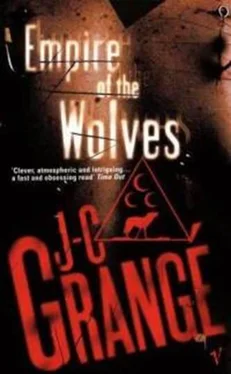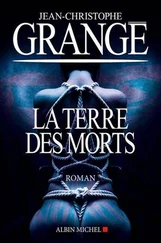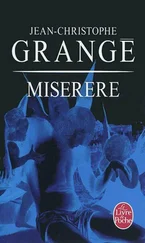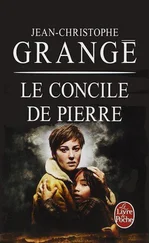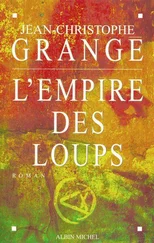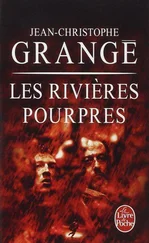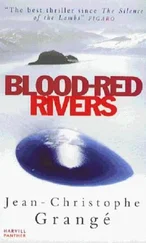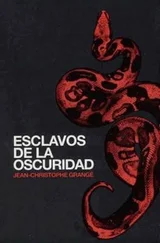The first one he saw was Philippe Charlier. Draped in his Loden coat, the Jolly Green Giant more than ever lived up to his nickname. Beside him, there was Christophe Beauvanier, in his baseball cap and leather jacket. The two officers Schiffer had quizzed last night, who seemed to have dashed there like jackals to check if his corpse really was cold. A little farther on, Paul made out Jean-Pierre Guichard, the public prosecutor; Claude Monestier, the chief commissioner at Louis-Blanc; and also Thierry Bomarzo, the magistrate, one of the few people present who knew what part Schiffer had played in this fuckup. Paul realized what this scene meant for him: his career was finished.
But the most amazing thing was the presence of Morencko, the head of OCRTIS, and of Pollet, chief of the Drug Squad. This was all rather excessive for the death of an ordinary retired inspector. It made Paul think of a bomb, whose true power is revealed only after it has exploded.
He approached, still hidden by the pillars. His head should have been teeming with questions. Instead, what struck him was the way this procession of dark figures, beneath the arches of the sanctuary, looked strangely like the funeral of Alpaslan Türkes. There was the same ceremony, same solemnity, same mustaches. In his own way, Jean-Louis Schiffer had also managed to get a state funeral.
He noticed an ambulance at the far end of the lawn, parked beside an underground entrance. Some male nurses in white coats were smoking cigarettes and talking with some uniformed officers. They were presumably waiting for the people from forensics to finish their job so that they could take the body away. That meant Schiffer was still inside.
Paul left his hiding place and headed for the entrance, sheltered by the privet hedges. He was going down the stairs when a voice hailed him: "Hey! You can't go down there!"
He turned around and brandished his card. The orderly froze, almost standing to attention. Without a word, Paul abandoned him to his surprise and went down as far as the cast-iron gate.
At first, it felt as if he was entering the maze of a mine, with its tunnels and landings. Then his eyes got used to the darkness and he made out the nature of the place. White and black alleyways punctuated with thousands of niches, names, wreathes suspended in glass cases. A troglodyte city dug out of the rock.
He leaned over a shaft that revealed the lower floors. A white halo was shining up from the second level down: the men from forensics were there. He found another staircase and took it. As he approached the light, the atmosphere seemed to get even darker and heavier. A peculiar smell of something dry, sharp and stony itched into his nose.
When he reached the floor, he turned right. He was now following the smell more than the light source. At the first turning, he saw some technicians dressed in white overalls, their heads covered by paper hats. They had set up their base camp at the intersection of several galleries. Their chrome-plated cases, lying on plastic sheets, were open to reveal test tubes, vials and sprays… Paul approached silently-the two figures had their backs to him.
He did not need to force a cough. The space was saturated with dust. The cosmonauts turned around. They were wearing masks shaped like an inverted Y. Once again, Paul flashed his card. One of them shook its insectlike head while raising its gloved hands.
A muffled voice issued forth impossible to tell which one was speaking: "Sorry, but we've started looking for fingerprints."
"Just a second. He was my partner. Jesus-you can understand that, can't you?"
The two Ys looked at each other. A few seconds passed. One of the technicians then grabbed a mask from his case. "Third row," he said. "Follow the projectors. And stay on the planks. Not a single step on the floor."
Ignoring the proffered mask, Paul set of.
The man stopped him. "Take it. You won't be able to breathe."
Paul cursed as he slipped the white shell over his head. l e went along the first alley on the left, across the raised planks, stepping over the cables of the projectors that had been set up at each intersection. The walls seemed to never end, repeating a sequence of niches and commemorative inscriptions while the air particles gained in density.
Finally, after a last turning, he understood the reason for such precautions. Beneath the halogens, everything was gray: the floor, walls and ceiling. The ashes of the dead had escaped from their urns, which had been blown apart by bullets. Dozens of them had rolled onto the ground, mingling their contents with the plaster and rubble.
On the walls, Paul managed to identify impacts coming from two different guns-a large caliber, like a shotgun, and a small semiautomatic pistol, probably a 9- or 45-mm.
He went on, fascinated by this lunar scene. He had seen photos of towns in the Philippines that had been shrouded over after a volcanic eruption, their streets frozen by the cooling lava. Haggard survivors, with faces like statues, carrying stone children in their arms. The same picture was now in front of him.
He crossed another yellow band. Then suddenly, at the end of a row, he saw him.
Schiffer had lived like a dog.
Now he had died like a dog-in a final burst of violence.
His totally gray body was arched up, sideways, with one leg bent back beneath his raincoat, his right hand raised, curled up like a cockerel's foot. Behind, a pool of blood ran out of what was left of his skull, as though one of his darkest dreams had exploded in his brains.
But the worst part was his face. The cinders covering him did not quite conceal the horror of the wounds. An eyeball had been torn out-excised, actually, with all of its socket. Lacerations dug into his throat, forehead and cheeks. One of them, which was longer and deeper, revealed the jawbone, then rose up to the torn socket. It drew his mouth out into a ghastly grin, overflowing with silvery pink slime.
Doubled up with a sudden fit of nausea, Paul pulled off his mask. But his guts were totally empty. In his convulsions, the only questions that came to mind were the obvious ones: Why had Schiffer come to this place? Who had killed him? Who could have sunk to such a degree of barbarity?
At that moment, he dropped to the ground and burst into tears. Within seconds, they were running down his cheeks, with him not even thinking of trying to hold them back or wipe away the mud that was building up on his face.
He was not crying for Schiffer.
Nor was he crying for the murdered women.
He was crying for himself.
For his loneliness and the blind alley he was now in.
"It's time we had a word, no?"
Paul turned around at once.
A man he had never seen before, in glasses, without a mask, and whose long, dust-covered face looked like a stalactite, was smiling at him.
"So it was you who put Schiffer back into circulation, was it?" The voice was clear, strong, almost merry, matching the blueness of the sky.
Paul shook the ash from his parka and sniffed-he had recovered a semblance of composure. "That's right. I needed some advice."
"What sort of advice?"
"I'm working on a series of murders, in the Turkish quarter in Paris.”
“Was your idea approved by your superiors?"
"You know the answer to that already"
The bespectacled man nodded. He was not just tall. His entire bearing seemed to surge up, with his haughty head, raised chin and high brows set off by gray curls. A top investigator in the prime of life, with the prying look of a greyhound.
Paul probed a little. "Is this an internal investigation?"
"No, I'm Olivier Amien. From the Geopolitical Drugs Observatory."
Paul had often heard this name during his time at OCRTIS. Amien was supposed to be the king of France 's antidrug war. A man in charge of both the national and international squads.
Читать дальше
